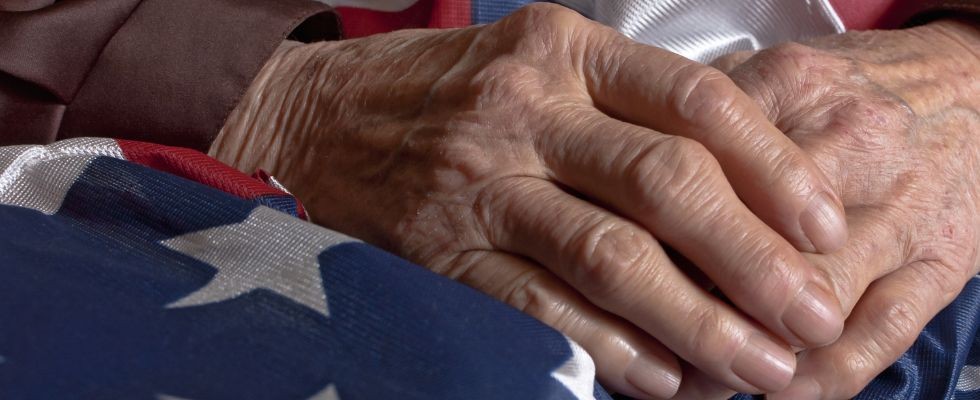
For those of us working in the home care sector, we know that to work in service to others is a choice and sometimes even a calling. We prioritize empathy and compassion. A client is not a contract, but an extension of our family.
This is particularly true when our veteran servicemen and women enlist our help, entrusting us to care for them as they age, relying on us to help them stay in the comfort of their homes and enjoy a higher quality of life with us by their side.
Serving Those Who Served
At SYNERGY HomeCare we have been caring for Veterans since our founding in 1999. Since that time, we are proud to have cared for more than 20,000 Veterans in 39 states. As the company has grown over the last five years, we wanted to set our network up for success in serving our nation’s veterans. To that end, we made a commitment to formalize our care for veterans in order to scale our services.
That meant working to get our franchise partners accredited with the U.S. Department of Veterans Affairs (VA) so they could be an approved service provider. It meant creating specially tailored program guides and collateral that tapped into the unique characteristics of military personnel. Then, in 2022, we launched an education initiative to raise awareness about homecare benefits for which veterans and their families may be eligible. Since then, we have dedicated a lot of time to educating the public about benefits that many veterans have no idea they may be entitled to through their service.
Getting the Word Out
That has been the biggest surprise to me: that people who have worked to protect our country don’t know about the protections they are entitled to. Because many servicemen and women leave the military and pursue civilian careers, they may forget about their VA benefits. They may not realize that there are a number of VA programs that may cover the cost of homecare to help them with things that may have become more challenging as they have gotten older. Perhaps they need some assistance with the activities of daily living, or accommodations for a chronic condition or disability, or some companionship to alleviate isolation. Some VA benefits even cover the cost of respite care for family caregivers.
There is a huge opportunity for outreach: according to the VA’s 2023 “Veteran Population Projection Model,” there are approximately 17 million U.S. veterans alive today. The U.S. Census reports that close to half are over 65, with one quarter aged 70 to 79. That’s somewhere in the range of 8 million people we could be helping.
Available Programs
So how exactly do we help? There are a number of ways that veterans can access homecare benefits:
- Homemaker, Home Health Aide & Respite: Benefit covers care for eligible veterans who need assistance with activities of daily living (ADL), are isolated or have a caregiver that needs a break from providing care.
- Aid & Attendance (A&A): VA Aid and Attendance or housebound benefits provide monthly payments added to the amount of a monthly VA pension for qualified veterans and survivors.
- Program of Comprehensive Assistance for Family Caregivers (PCAFC): The VA now includes assistance for family caregivers of eligible veterans. They must be a family member or live with the veteran full-time to be considered. Each veteran is allowed to have one primary caregiver receive a stipend for their services, along with at least 30 days of respite each year and other benefits.
- Veteran Directed Care (VDC): The VA's Veteran Directed Care program allows veterans to manage their own care. VDC offers veteran-directed homecare services and allows them to hire caregivers to help them age in place. Eligibility is based on a veteran's health status or care needs.
Eligibility requirements vary by program. For more information on eligibility, visit va.gov/health-care/eligibility or call 1 (800) 827-1000 for direct VA support.
It Takes a Village
As a national homecare franchisor, we seek out partnerships with like-minded organizations that can elevate the services we provide and extend our reach by working together. We work with local Veteran Service Organizations (VSOs) and partners, when appropriate, to support veterans with accessing benefits and determining if they're eligible for the aid and attendance pension.
PsychArmor, a national nonprofit organization that provides training for businesses that want to engage with veterans, has also been an invaluable resource for us as we seek to provide personalized care for veterans that is sensitive to their unique position. Veterans are often resistant to having someone else look after them, and it’s important to understand why.
According to PsychArmor, they could be embarrassed by their physical limitations or memory lapses that don’t align with their military identity. Their career in the military involved serving others, so being on the receiving end of service may be out of their comfort zone. The culture of leadership in the military instilled a sense of responsibility for and accountability to others that can make it difficult to accept care or ask for help.
Bringing Our Vision to Life
When we think about serving those who served, the vision is simple: we place a compassionate, empathetic caregiver with a veteran whose life is enhanced by our service. The reality is much more complicated. As a franchisor, we have worked tirelessly to educate veterans about their potential homecare benefits and remove obstacles to receiving care, while also positioning our franchise partners to be in a position to provide care for veterans.
Our vision is to connect to every veteran who can benefit from homecare services to remain in their home, educate them on what programs they may be able to take advantage of and let them choose the provider they feel most comfortable with. It’s a lofty goal, and one that we take very seriously.
Rich Paul is the chief operating officer at SYNERGY HomeCare.
